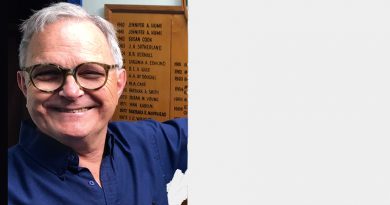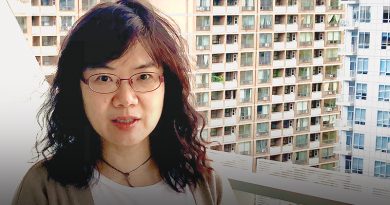Nancy Wood
Dr. Nancy Wood talks with Sue Careless about serving with her husband Philip as a medical missionary in Africa.
TAP: Did you grow up in a Christian home?
NW: Yes, both sets of my grandparents actively served the Lord. My maternal grandparents were missionaries in South Africa for seven years. My grandfather built McCord Memorial Hospital in Durban, which is still standing. My paternal grandparents founded the church where I grew up, Bethel Baptist in Leaside [Toronto].
TAP: What helped solidify your Christian commitment?
NW: Good Sunday School teachers and the memorization of Scripture.
TAP: What was your medical specialty?
NW: I had studied Food Chemistry and Nutrition at the University of Toronto and nutrition became quite a focus both for Pediatrics and later for Diabetics. Philip and I also studied Tropical Medicine in Belgium in French which was invaluable. That was really our specialty.
TAP: Did you practice far more specialities in the field?
NW: Yes. Philip looked after all the surgical patients and left me the rest!
TAP: Have you taken further medical training?
NW: In 1980 The Christian Medical and Dental Association USA organised a medical refresher course in Kenya for ten days for doctors working in Africa. It was like taking a drink from a fire hose. And I felt like a parched bush in the desert. The medical teaching was excellent. And meeting people we had never met before, but who were doing the same kind of work as us was very refreshing. We attended nine times between 1980 and 2012. When we were living and working in Hamilton, from 1990 to 2001, I regularly attended refresher courses at McMaster – about 60 hours a year.
TAP: Where did you meet your husband?
NW: Short version. He was a total stranger who telephoned my mother and she invited him to dinner.
TAP: The Democratic Republic of the Congo (DRC) is a French-speaking country. How good is your French?
NW: Pretty fluent. We had Swiss French colleagues for our first 14 years and always spoke in French with them. We had Bible study and prayer with one Swiss couple weekly for about three years. We teach in French. I have been reading my Bible and a devotional booklet in French since I finished high school – that was a long time ago! I keep working on it. I have a dictionary underneath my Bible and look up about one word a day.
TAP: Can you function in Swahili?
Yes, it is necessary in the hospital and in the market. Occasionally I have given a devotional message or full sermon in Swahili.
TAP: What attracted you to the very place Helen Roseveare had served?
NW: God led me there. The chairman of a Canadian Medical and Dental Society meeting said there was a need for short and long-term medical and paramedical workers. I offered my summer after first year Meds. He found me a job in Kampala, Uganda. Before leaving I met a couple in Toronto, Peter and Mary Lou Stam, who had just returned from 20 years in Congo. They helped me get a visa for Congo and told me to go on their name because they had been field leaders of the 150+ AIM missionaries. I found a ride from Kampala to Congo, stayed with AIM missionaries and met Dr. Helen at Nyankunde Hospital where I stayed for four days. She was training auxiliary nurses in French, almost all men who could serve as nurse practitioners in rural areas without doctors, and the whole set-up was inter-mission and co-operative.
TAP: Had you read any of her books before you met her?
NW: Yes, less than six months earlier I had bought Give Me This Mountain (1966) at Urbana ’67.
TAP: When you met her, what impression did you form? She was committed and ready to give her all.
TAP: When did you feel most in danger in DRC?
NW: In contrast to Philip, I have never really felt endangered by people, but on a few of our road trips the safety of the bridges was dubious and in a few mud holes in the roads, we wondered if we would ever get out.
TAP: Were some of your staff killed in the horrendous 2002 massacre in Nyankunde?
NW: Yes. I was in Canada visiting my mother at the time but Philip was there. A number of staff, maybe 20, who knew they were targets, hid in the roof of the operating room and the Medical Director took them food. The bandits noticed this and told him they would not kill the people if they came down. When they came down, they were tied by their ankles to one another and taken to a nurse’s house and made to sit on the floor side by side for a day or two. There were no meals, no drinks and no toilet breaks. On the second or third day, the bandit soldiers began calling them out one by one. Some were killed on the spot, some were made to carry furniture or other booty to the bandits’ homes about 60 km away and there they were killed. One girl who told me all this was allowed to run free because she had grown up in the house next to the soldier who was supposed to kill her. The one person I know for sure who was in this group was one of the hospital chaplains, Samuel. He had recently acquired a Masters in Theology and had been very effective in his work.
TAP: After the massacre did Philip join you in Canada? After all, your hospital had been destroyed.
NW: No, we met up in England to ask the Lord for our next steps and He showed us we should go back to Congo. We returned about six weeks after the devastation to the next church hospital at Oicha, about 150 km south of Nyankunde.
TAP: What encouraged you to return to DRC?
NW: His leading. We knew the languages, the culture somewhat and the very dear people we had trained and worked with. We had five invitations to other countries: Angola, Gambia, Niger, Chad and Ghana. We discussed this at length with the missionary committee of the church we attend in the UK and then all 12 of them prayed for us.
TAP: Is it likely that one of the CME hospitals would knowingly accept an Ebola patient or is it more likely they would be referred to a special Ebola clinic to protect the other hospital patients?
NW: For the last year there has been a control check at the entrance to the three hospitals where each person is to wash their hands and have their temperature taken. If they are suspected of Ebola then or anytime after that they will be sent to an Ebola triage centre and then to an Ebola treatment centre if they are positive.
TAP: For outsiders, who only hear the bad news about DRC, what is attractive about the country & its people?
NW: The country has much natural beauty: tropical rain forest, rare birds, higher hills with secondary growth of cedars and eucalyptus, some bare rocky hills and valleys where people cultivate the slopes, sandy beaches by lakes that are not safe to swim in, and volcanoes. Most of the people are very friendly, appreciative, kind, thoughtful, considerate and generous, sharing the very little that they have. Almost always we are greeted with warm smiles. There is less formality than in Canada.
TAP: What draws you back there?
NW: The people and the opportunity to teach the nurses and medical students. They only pass through the courses once and they deserve to be well taught. I know God created me a teacher. And the opportunity to be useful in mentoring the staff of the college, one by one.
TAP: Were you both attending Little Trinity in Toronto before you left for overseas?
NW: Yes, I began attending morning and evening services in 1967 when living on campus at U of T. Philip came to Canada in 1971 and we attended together if I was not working. We were married at Little T by Harry Robinson Aug 5th, 1972 and left two weeks later for Belgium to study Tropical Medicine together.
TAP: Do you attend an Anglican church there?
NW: No, Nyankunde mission station had been started by the Plymouth Brethren in 1929 and all who came to work at the hospital were asked to attend the one Brethren Assembly. Since moving to the city of Bunia in 2007 there are many churches to choose from and our favourite is a daughter church of AIM, CECA 20 Ville. The Swahili service is attended by at least 800 people and the French service (10am to noon) is attended by 1200 or more.
TAP: Is there a Bible verse that has particularly inspired you?
NW: Our work hasn’t always gone as we might have hoped or planned so Habakkuk 3:17 has been a blessing. “Though the fig tree does not bud and there are no grapes on the vines, though the olive crop fails and the fields produce no food, though there are no sheep in the pen and no cattle in the stalls, yet will I rejoice in the Lord, I will be joyful in God my Saviour. The Sovereign Lord is my strength; He makes my feet like the feet of a deer; he enables me to tread on the heights.” Even more important to me is John 13:34, 35 “A new command I give you: Love one another. As I have loved you, so you must love one another. By this everyone will know that you are my disciples, if you love one another.” This verse is the number one priority in my mind and heart. TAP




